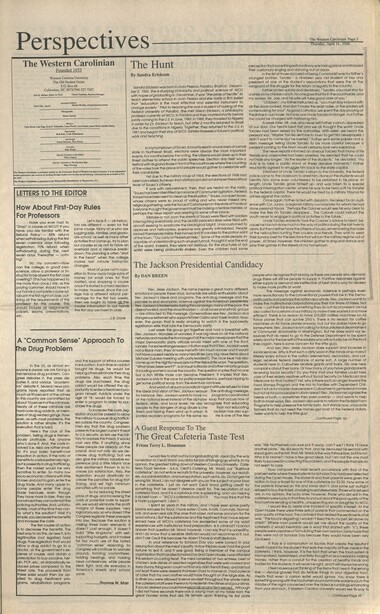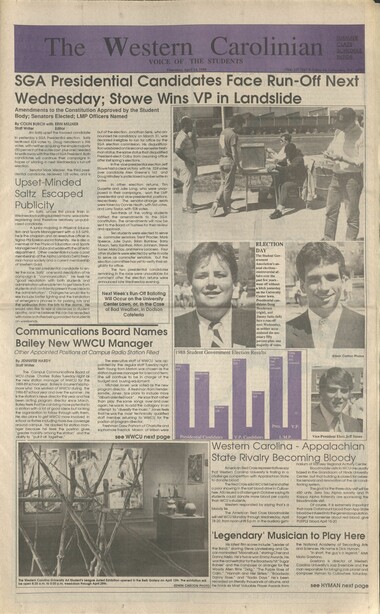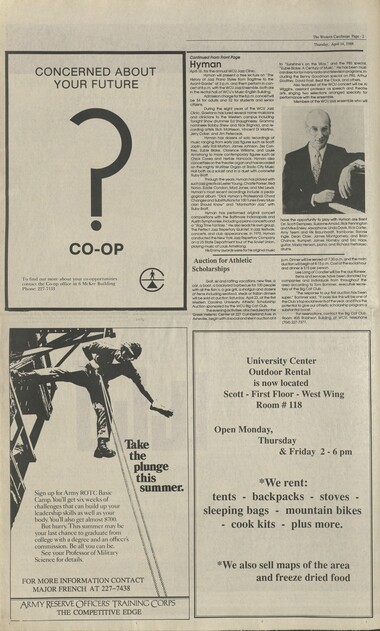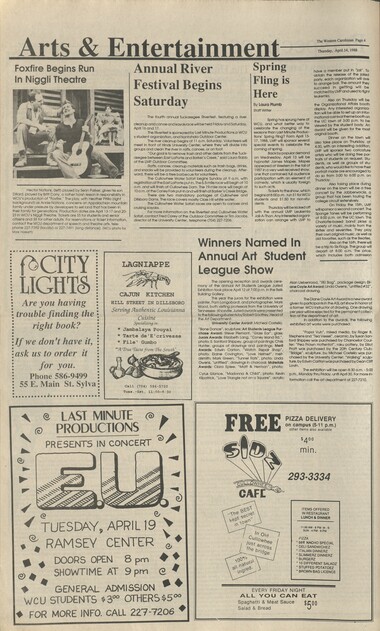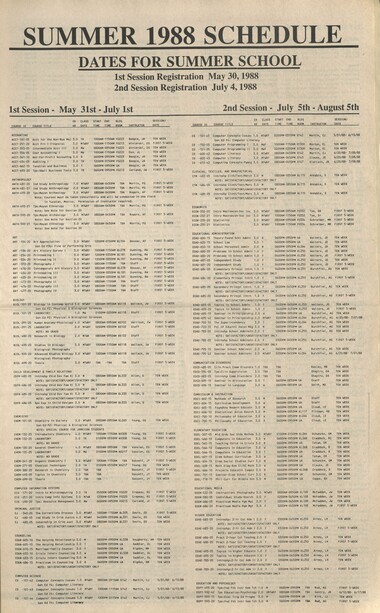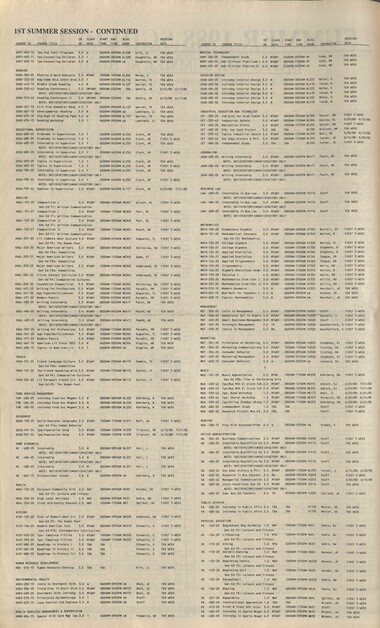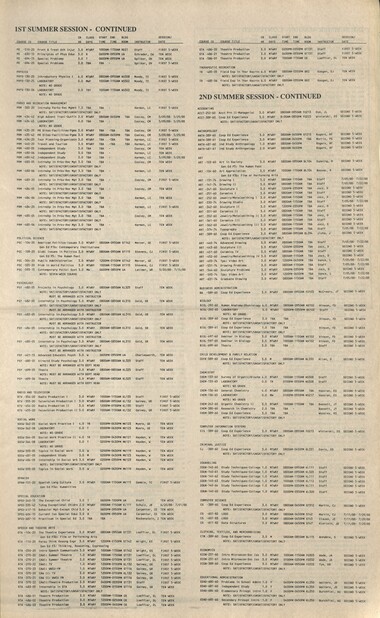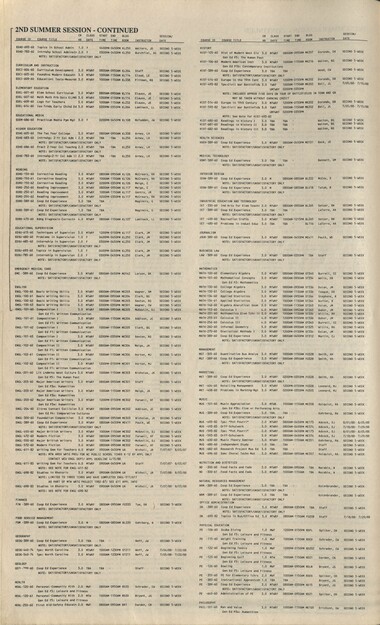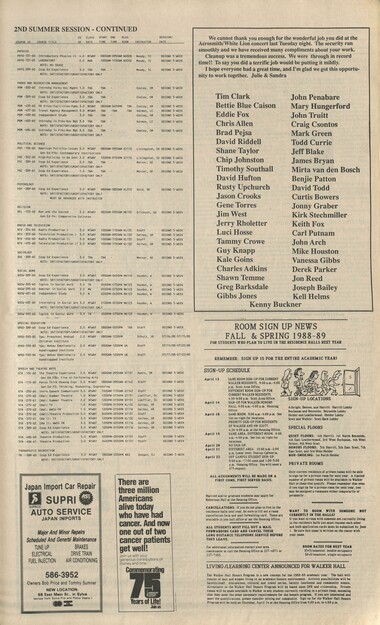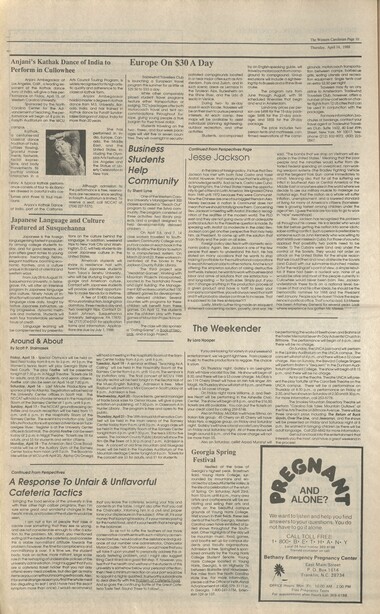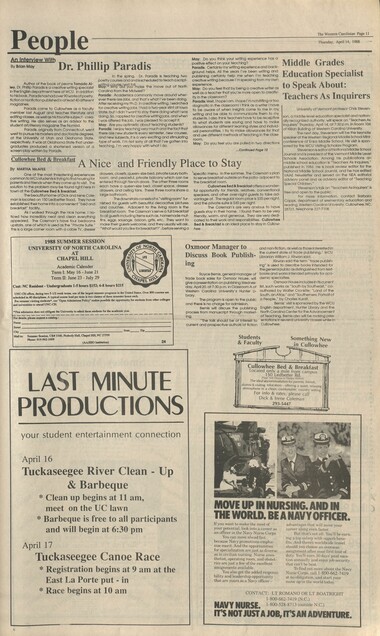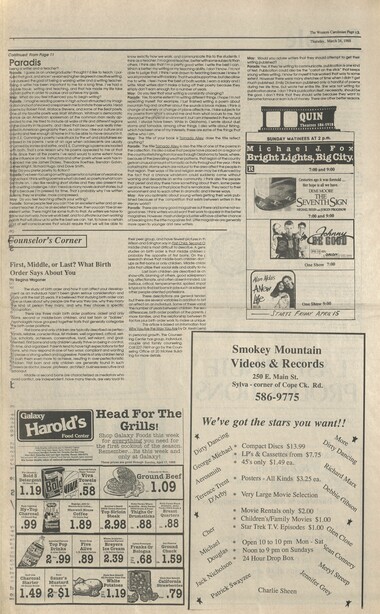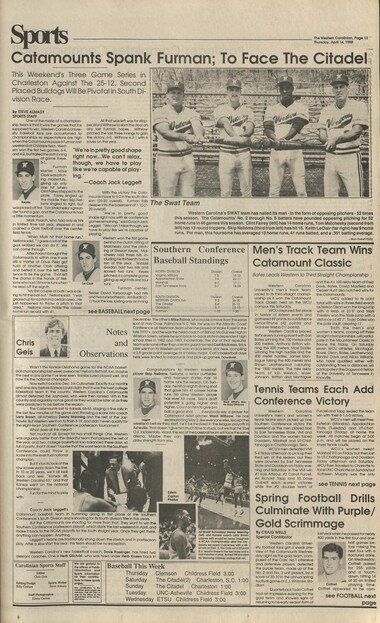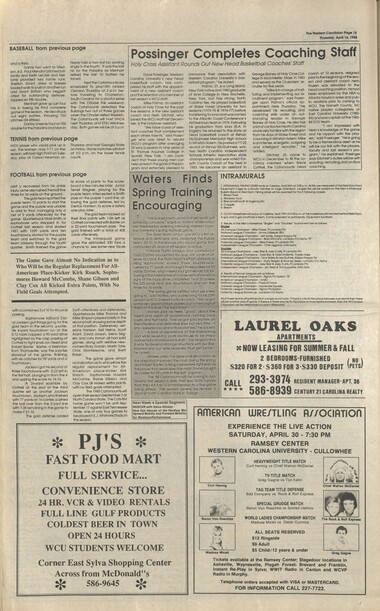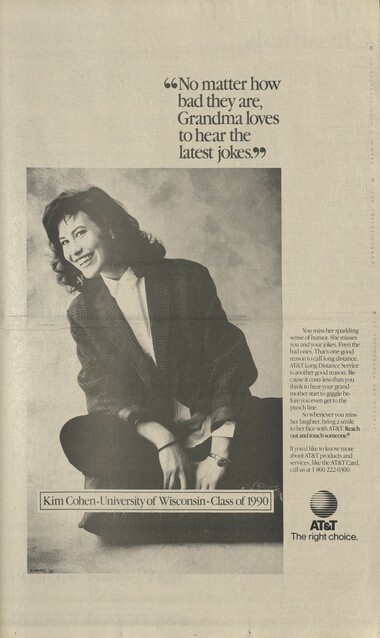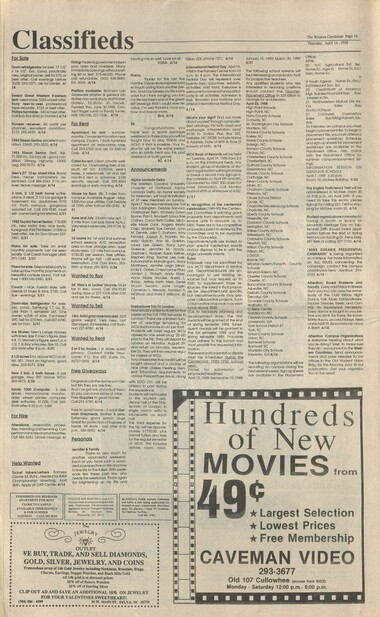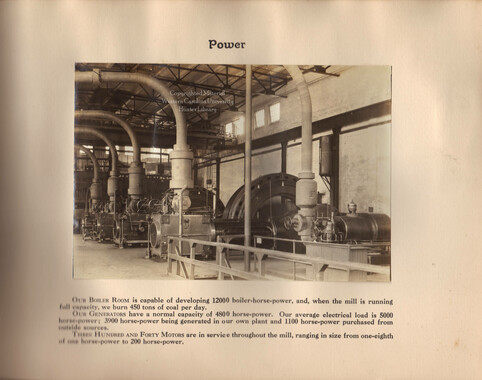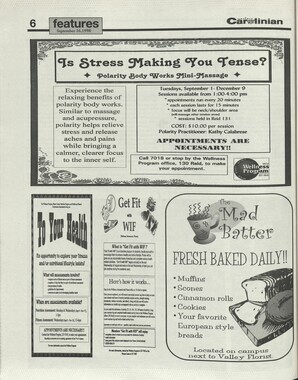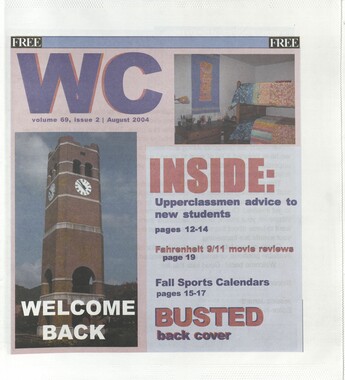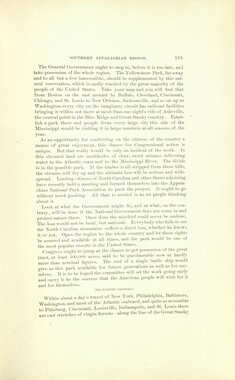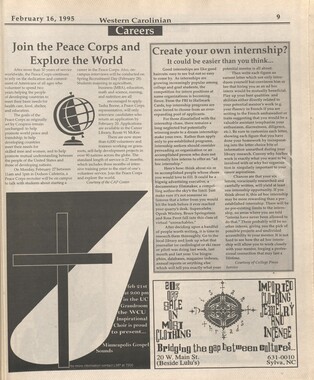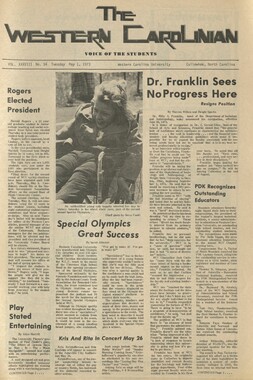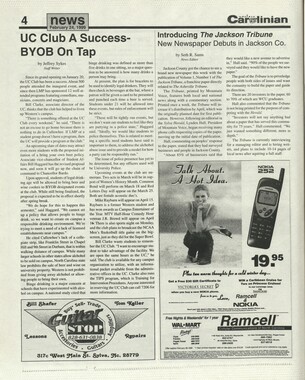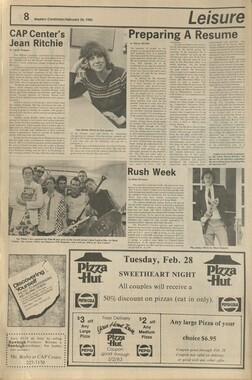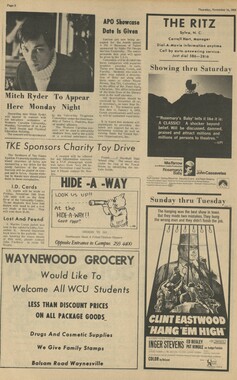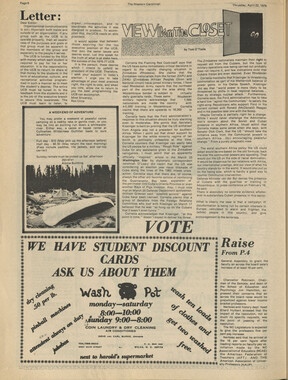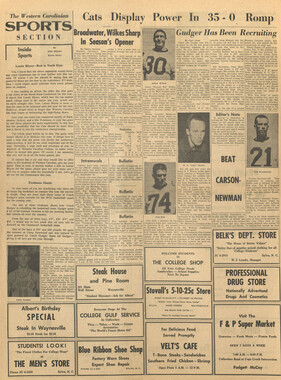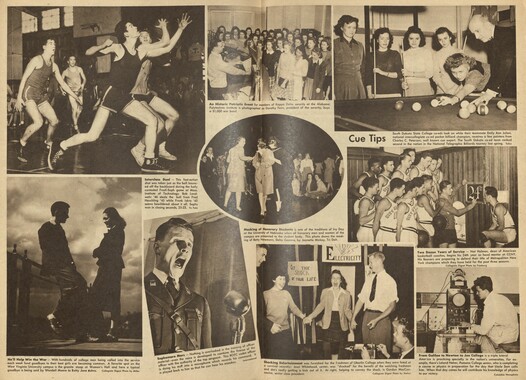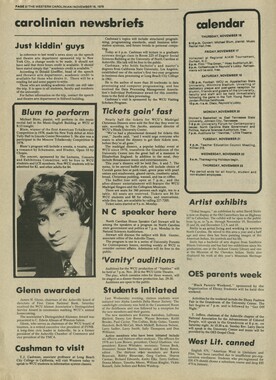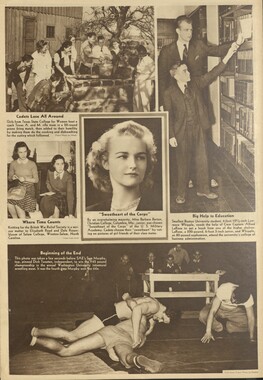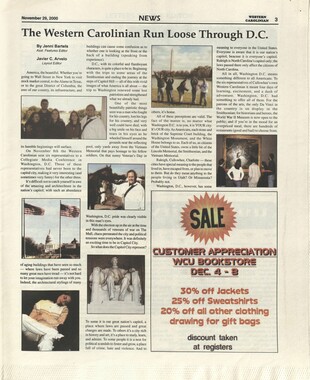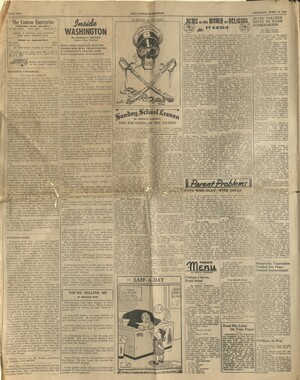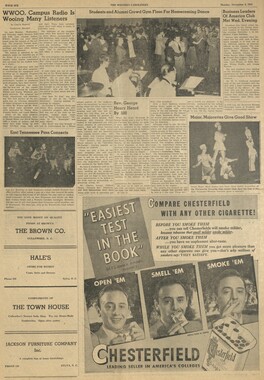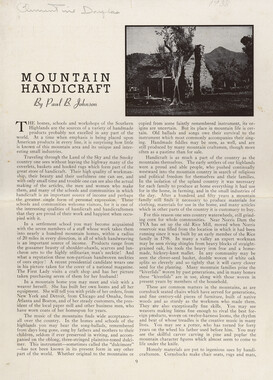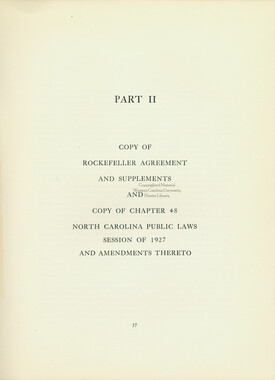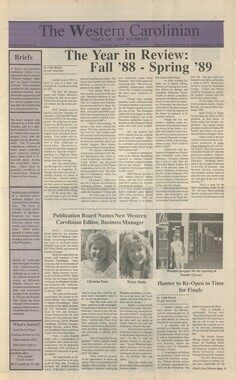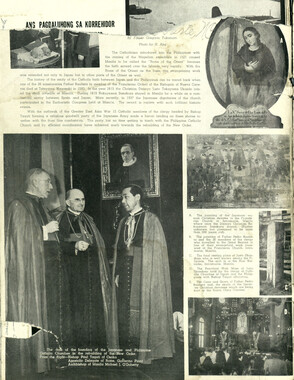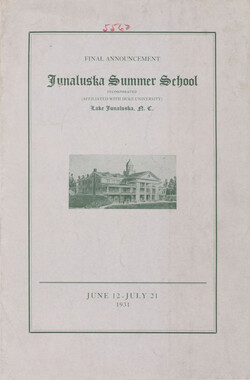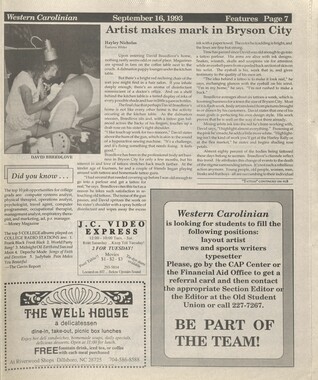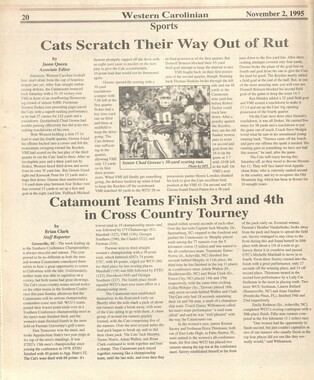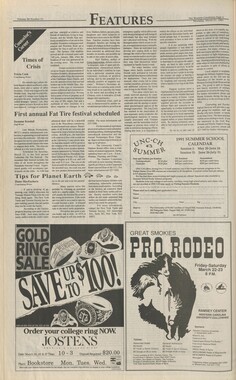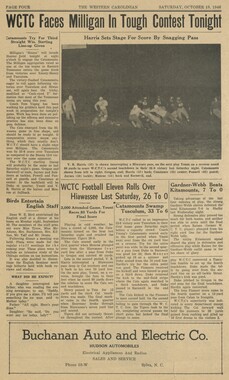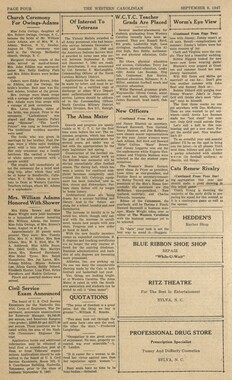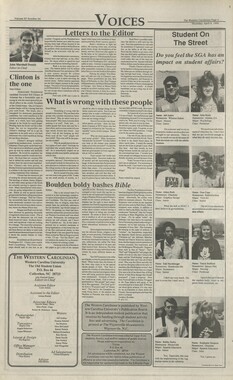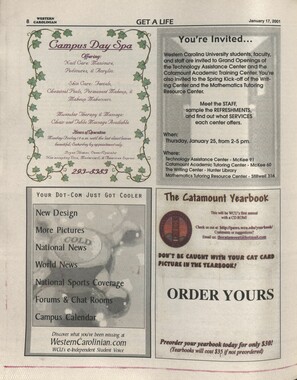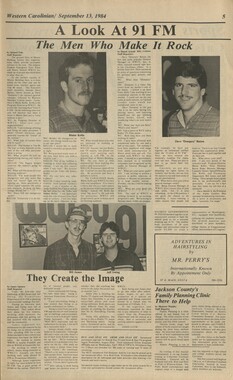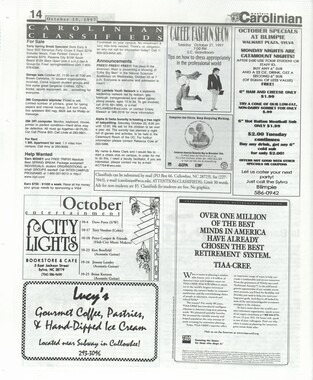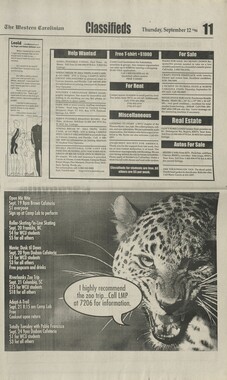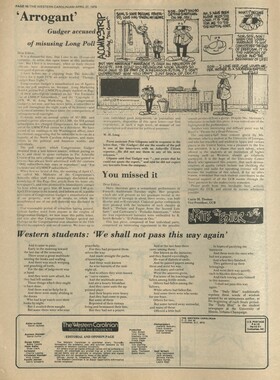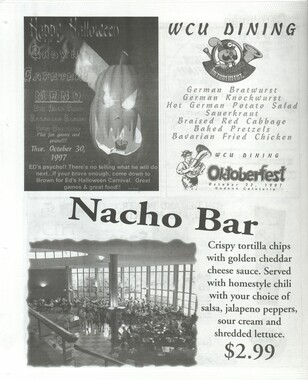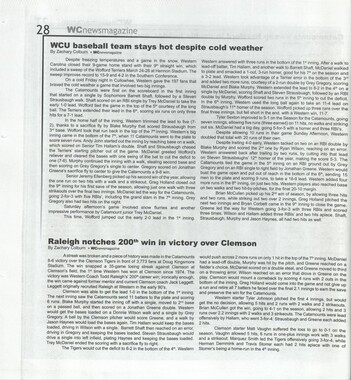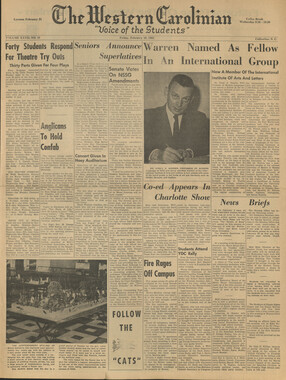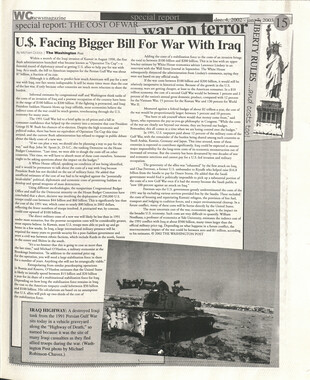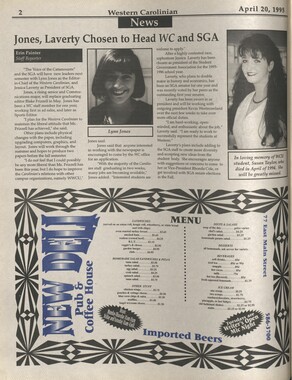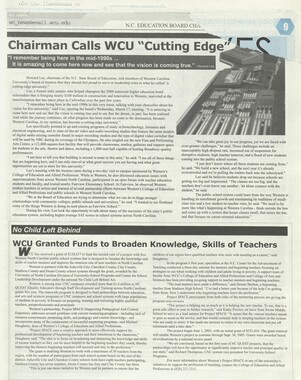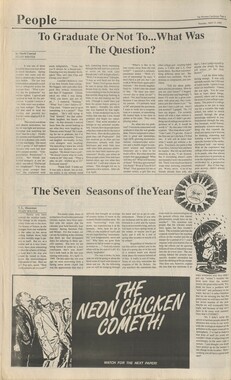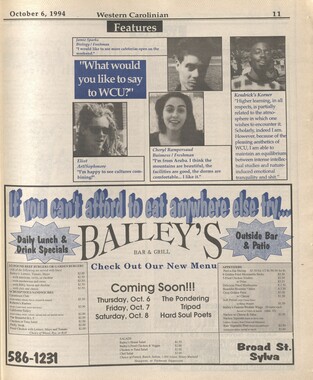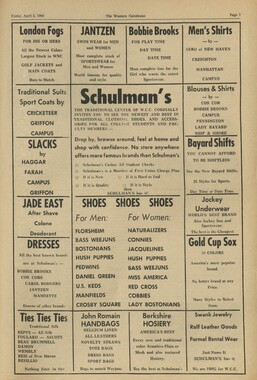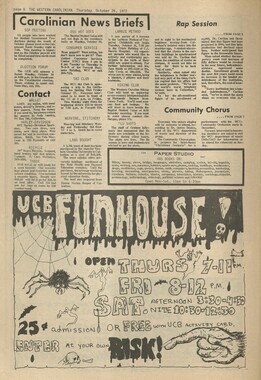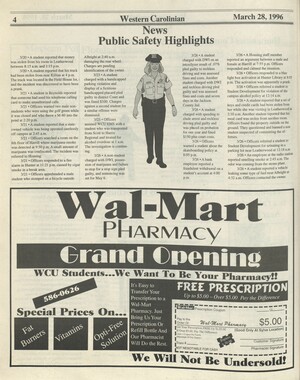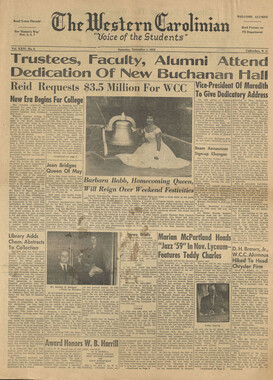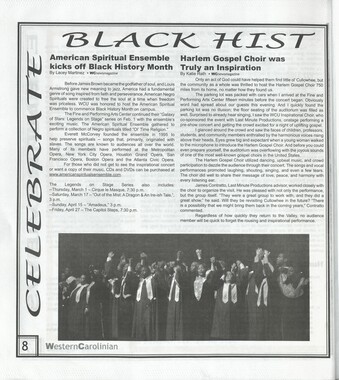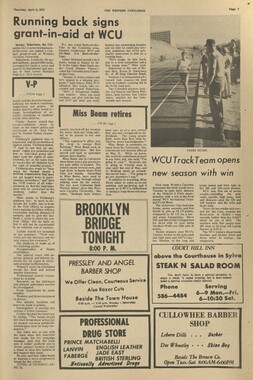Western Carolina University (20)
View all
- Canton Champion Fibre Company (2308)
- Cherokee Traditions (291)
- Civil War in Southern Appalachia (165)
- Craft Revival (1942)
- Great Smoky Mountains - A Park for America (2857)
- Highlights from Western Carolina University (430)
- Horace Kephart (941)
- Journeys Through Jackson (154)
- LGBTQIA+ Archive of Jackson County (85)
- Oral Histories of Western North Carolina (314)
- Picturing Appalachia (6772)
- Stories of Mountain Folk (413)
- Travel Western North Carolina (160)
- Western Carolina University Fine Art Museum Vitreograph Collection (129)
- Western Carolina University Herbarium (92)
- Western Carolina University: Making Memories (708)
- Western Carolina University Publications (2353)
- Western Carolina University Restricted Electronic Theses and Dissertations (146)
- Western North Carolina Regional Maps (71)
- World War II in Southern Appalachia (131)
University of North Carolina Asheville (6)
View all
- Allanstand Cottage Industries (62)
- Appalachian National Park Association (53)
- Bennett, Kelly, 1890-1974 (1388)
- Berry, Walter (76)
- Brasstown Carvers (40)
- Carver, George Washington, 1864?-1943 (26)
- Cathey, Joseph, 1803-1874 (1)
- Champion Fibre Company (233)
- Champion Paper and Fibre Company (297)
- Cherokee Indian Fair Association (16)
- Cherokee Language Program (22)
- Crowe, Amanda (40)
- Edmonston, Thomas Benton, 1842-1907 (7)
- Ensley, A. L. (Abraham Lincoln), 1865-1948 (275)
- Fromer, Irving Rhodes, 1913-1994 (70)
- George Butz (BFS 1907) (46)
- Goodrich, Frances Louisa (120)
- Grant, George Alexander, 1891-1964 (96)
- Heard, Marian Gladys (60)
- Kephart, Calvin, 1883-1969 (15)
- Kephart, Horace, 1862-1931 (313)
- Kephart, Laura, 1862-1954 (39)
- Laney, Gideon Thomas, 1889-1976 (439)
- Masa, George, 1881-1933 (61)
- McElhinney, William Julian, 1896-1953 (44)
- Niggli, Josephina, 1910-1983 (10)
- North Carolina Park Commission (105)
- Osborne, Kezia Stradley (9)
- Owens, Samuel Robert, 1918-1995 (11)
- Penland Weavers and Potters (36)
- Roberts, Vivienne (15)
- Roth, Albert, 1890-1974 (142)
- Schenck, Carl Alwin, 1868-1955 (1)
- Sherrill's Photography Studio (2565)
- Southern Highland Handicraft Guild (127)
- Southern Highlanders, Inc. (71)
- Stalcup, Jesse Bryson (46)
- Stearns, I. K. (213)
- Thompson, James Edward, 1880-1976 (226)
- United States. Indian Arts and Crafts Board (130)
- USFS (683)
- Vance, Zebulon Baird, 1830-1894 (1)
- Weaver, Zebulon, 1872-1948 (58)
- Western Carolina College (230)
- Western Carolina Teachers College (282)
- Western Carolina University (1840)
- Western Carolina University. Mountain Heritage Center (18)
- Whitman, Walt, 1819-1892 (10)
- Wilburn, Hiram Coleman, 1880-1967 (73)
- Williams, Isadora (3)
- Cain, Doreyl Ammons (0)
- Crittenden, Lorraine (0)
- Rhodes, Judy (0)
- Smith, Edward Clark (0)
- Appalachian Region, Southern (2569)
- Asheville (N.C.) (1923)
- Avery County (N.C.) (26)
- Blount County (Tenn.) (169)
- Buncombe County (N.C.) (1672)
- Cherokee County (N.C.) (283)
- Clay County (N.C.) (555)
- Graham County (N.C.) (233)
- Great Smoky Mountains National Park (N.C. and Tenn.) (519)
- Haywood County (N.C.) (3567)
- Henderson County (N.C.) (70)
- Jackson County (N.C.) (4740)
- Knox County (Tenn.) (31)
- Knoxville (Tenn.) (12)
- Lake Santeetlah (N.C.) (10)
- Macon County (N.C.) (420)
- Madison County (N.C.) (215)
- McDowell County (N.C.) (39)
- Mitchell County (N.C.) (132)
- Polk County (N.C.) (35)
- Qualla Boundary (981)
- Rutherford County (N.C.) (76)
- Swain County (N.C.) (2117)
- Transylvania County (N.C.) (270)
- Watauga County (N.C.) (12)
- Waynesville (N.C.) (84)
- Yancey County (N.C.) (72)
- Aerial Photographs (3)
- Aerial Views (60)
- Albums (books) (4)
- Articles (1)
- Artifacts (object Genre) (228)
- Bibliographies (1)
- Biography (general Genre) (2)
- Cards (information Artifacts) (38)
- Clippings (information Artifacts) (191)
- Crafts (art Genres) (622)
- Depictions (visual Works) (21)
- Design Drawings (1)
- Drawings (visual Works) (184)
- Envelopes (73)
- Facsimiles (reproductions) (1)
- Fiction (general Genre) (4)
- Financial Records (12)
- Fliers (printed Matter) (67)
- Glass Plate Negatives (381)
- Guidebooks (2)
- Internegatives (10)
- Interviews (815)
- Land Surveys (102)
- Letters (correspondence) (1013)
- Manuscripts (documents) (618)
- Maps (documents) (177)
- Memorandums (25)
- Minutes (administrative Records) (59)
- Negatives (photographs) (5926)
- Newsletters (1285)
- Newspapers (2)
- Occupation Currency (1)
- Paintings (visual Works) (1)
- Pen And Ink Drawings (1)
- Periodicals (193)
- Personal Narratives (10)
- Photographs (12976)
- Plans (maps) (1)
- Poetry (5)
- Portraits (4535)
- Postcards (329)
- Programs (documents) (151)
- Publications (documents) (2305)
- Questionnaires (65)
- Scrapbooks (282)
- Sheet Music (2)
- Slides (photographs) (402)
- Songs (musical Compositions) (2)
- Sound Recordings (796)
- Specimens (92)
- Speeches (documents) (15)
- Tintypes (photographs) (8)
- Transcripts (322)
- Video Recordings (physical Artifacts) (23)
- Vitreographs (129)
- Text Messages (0)
- A.L. Ensley Collection (275)
- Appalachian Industrial School Records (7)
- Appalachian National Park Association Records (336)
- Axley-Meroney Collection (2)
- Bayard Wootten Photograph Collection (20)
- Bethel Rural Community Organization Collection (7)
- Blumer Collection (5)
- C.W. Slagle Collection (20)
- Canton Area Historical Museum (2110)
- Carlos C. Campbell Collection (373)
- Cataloochee History Project (64)
- Cherokee Studies Collection (4)
- Daisy Dame Photograph Album (5)
- Daniel Boone VI Collection (1)
- Doris Ulmann Photograph Collection (112)
- Elizabeth H. Lasley Collection (1)
- Elizabeth Woolworth Szold Fleharty Collection (4)
- Frank Fry Collection (95)
- George Masa Collection (173)
- Gideon Laney Collection (452)
- Hazel Scarborough Collection (2)
- Hiram C. Wilburn Papers (28)
- Historic Photographs Collection (236)
- Horace Kephart Collection (861)
- Humbard Collection (33)
- Hunter and Weaver Families Collection (1)
- I. D. Blumenthal Collection (4)
- Isadora Williams Collection (4)
- Jesse Bryson Stalcup Collection (47)
- Jim Thompson Collection (224)
- John B. Battle Collection (7)
- John C. Campbell Folk School Records (80)
- John Parris Collection (6)
- Judaculla Rock project (2)
- Kelly Bennett Collection (1407)
- Love Family Papers (11)
- Major Wiley Parris Civil War Letters (3)
- Map Collection (12)
- McFee-Misemer Civil War Letters (34)
- Mountain Heritage Center Collection (4)
- Norburn - Robertson - Thomson Families Collection (44)
- Pauline Hood Collection (7)
- Pre-Guild Collection (2)
- Qualla Arts and Crafts Mutual Collection (12)
- R.A. Romanes Collection (681)
- Rosser H. Taylor Collection (1)
- Samuel Robert Owens Collection (94)
- Sara Madison Collection (144)
- Sherrill Studio Photo Collection (2558)
- Smoky Mountains Hiking Club Collection (616)
- Stories of Mountain Folk - Radio Programs (374)
- The Reporter, Western Carolina University (510)
- Venoy and Elizabeth Reed Collection (16)
- WCU Gender and Sexuality Oral History Project (32)
- WCU Mountain Heritage Center Oral Histories (25)
- WCU Oral History Collection - Mountain People, Mountain Lives (71)
- WCU Students Newspapers Collection (1784)
- Western North Carolina Tomorrow Black Oral History Project (69)
- William Williams Stringfield Collection (2)
- Zebulon Weaver Collection (109)
- African Americans (390)
- Appalachian Trail (35)
- Artisans (521)
- Cherokee art (84)
- Cherokee artists -- North Carolina (10)
- Cherokee language (21)
- Cherokee pottery (101)
- Cherokee women (208)
- Church buildings (170)
- Civilian Conservation Corps (U.S.) (110)
- College student newspapers and periodicals (1876)
- Dams (107)
- Dance (1023)
- Education (222)
- Floods (61)
- Folk music (1015)
- Forced removal, 1813-1903 (2)
- Forest conservation (220)
- Forests and forestry (1184)
- Gender nonconformity (4)
- Great Smoky Mountains National Park (N.C. and Tenn.) (181)
- Hunting (45)
- Landscape photography (25)
- Logging (118)
- Maps (83)
- Mines and mineral resources (8)
- North Carolina -- Maps (18)
- Paper industry (38)
- Postcards (255)
- Pottery (135)
- Railroad trains (71)
- Rural electrification -- North Carolina, Western (3)
- School integration -- Southern States (2)
- Segregation -- North Carolina, Western (5)
- Slavery (5)
- Sports (452)
- Storytelling (243)
- Waterfalls -- Great Smoky Mountains (N.C. and Tenn.) (66)
- Weaving -- Appalachian Region, Southern (280)
- Wood-carving -- Appalachian Region, Southern (328)
- World War, 1939-1945 (173)
Western Carolinian, April 14, 1988 (Volume 53 Number 25)
Item
Item’s are ‘child’ level descriptions to ‘parent’ objects, (e.g. one page of a whole book).
-
-
Perspectives The Western Carolinian Page 3 Thursday, April 14, [M The Western Carolinian Founded 1933 Western Carolina University The Old Student Union P.O. Box 66 Cullowhee, NC 2872(704) 227-7267 Erin H. Millner. Editor in Chief Carole TruXham, Business Manager Chris GeU , Sports Associate Editors Martha McAfee, PeopleAEntertainment Photography Edwin Carlton The Hunt By Sandra Erickson Colin Burch, Liu Pfcge, Scon P. Stalmaaek, Laura Plumb, Lara Hooper. Jason Ward. Jennifer Hardy Typesetting Bob Buhl, Linda Bodcnhamer Ad Design Sandy Delmont, Kirk Nelson Ad Sales Kara Wykle Special Assistant to the Editor Billy Graham Special Assistant to The Business Mgr. Mary Fleming Pie Western Carolinian is publisted weekly by the Publication Board of Western Carolina University. It is an independent rtudent publication that recieves its funding through student activity fees and advertising. Subscriptions are available at $16 per year, rhe Western Carolinian ia publiabBd at the Waynesville Mountaineer in Waynesville. N.C. LETTERS TO THE EDITOR How About First-Day Rules For Professors Have you ever had to "Drop" a course at WCU? If you have, you are familiar with the Refund Policy — 85% refund when withdrawing during the first seven calendar days following registration, 70% refund when withdrawing during the next seven days. Thereafter — nothing! So, my concern—How can the college. In good conscience, allow a professor or Instructor to be absent the first class meeting? (This has happened to me more than once.) We, as the paying customer, should have in our hands a complete course syllabus In the first night of class, outlining all the requirements of this professor for this course. This should Include all assignments, papers, exams, presentations, etc. Let's face It — all Instructors are different — even for the same course. Many of us who are juggling jobs, families, and graduate school, as well as many other activities that come up, try to plan our courses so as not to have an overload and a nervous breakdown. This planning Is often "shot in the head" when the college makes last minute instructor changes. Most of us are not In a position to throw away large sums of money (or small ones for that matter), and dropping a course once It is started Is a hard decision to make. However, since the college has a different refund percentage for the first two weeks, then we ought to have all the course information in our hands the first day we meet in class. J.B. Davis Sandra Erickson was bom in Joao Pessoa, Paraiba. Brazil on December 2. 1960. She is studying philosophy and political science at WCU with hopes of graduating in December. It was "the pride of her life" to teach elementary school In Joao Pessoa and she holds a firm belief that "education Is the most effective and essential Instrument to change society." Prior to teaching she was a student of nursing at the Federal University of Paraiba. She met Glenn Erickson, a philosophy professor currently at WCU. In Paraiba and they married shortly before jointly coming to the U.S. in June. 1983. In 1985. they traveled to Nigeria in order for Dr. Erickson to teach, but after 2 months returned to Brazil due to the conditions in Nigeria. Together, they returned to the U.S. In 1987 and began their stay at WCU. Sandra foresees a future In political work and teaching. In my hometown of Sousa, a county seat In a rural area of a small state In Northeast Brazil, elections were always the most important events. For months before the voting, the citizens would dress up in their finest clothes to attend the public speeches. Election day Itself was a festival with its grand finale In front of the courthouse where the counting of the votes took the place and people would gather to celebrate with their candidates. Yet due to the military coup of 1964. the elections of 1968 had been cancelled. But even that arbitrary act did not dampen the political fever of Sousa's citizens. It was with astonishment, then, that we heard on the radio, "Sousa has been identified asa source of Communist agitation. Federal troops have been sent to clean up the situation." Sousa, our quiet Sousa. whose citizens were so proud of voting and who never missed any religious gathering, was 1he focusof Communism in the state of Paraiba! Everyone thought the government must be making a terrible mistake. or perhaps the news report was referring to some other place. Mistake or not, soon the streets of Sousa were filled with soldiers interrogating everybody and the usually peaceful skies were filled with aircraft seeking to eradicate the ideological blight. Unaccustomed to airplanes and helicopters, everyone was greatly intimidated. People locked themselves inside their homes and lit candles to the patron saint of the town. "Our Lady of Perpetual Help." Some of the older people, incapable of understanding such unusual turmoil, thought it was the end of the world. Indeed, they were not delirious, for the structures of our world were being profoundly shaken. Even the children had some A "Common Sense" Approach To The Drug Problem In the US. as almost everyone is aware, we are facing a tremendous drug problem. Congress debates it, the press debates it, and various "academics" debate It. Several news programs have reported that as much as 90 percent of the crimes In this country are committed by about 10 percent of the criminals. Nearly all of these criminals are hard-core drug addicts, or members of drug related gangs. However, as with most problems, the solution is rather simple; It's the execution that Is hard. Here's the crux of the problem. Selling drugs Is tremendously profitable. Ask anyone who's done It. And, the costs Involved (I.e. risks) are rather small. So It's your basic benefit-cost equation in action. If the ratio of benefits to costs Is extremely high, as it is presently in drug trafficking, then the career would be very lucrative to enter. So many low socio-economic citizens with little to lose, and a lot to gain, enter the drug trade. And many upper income people enter the drug trade because, even though they have more to lose, they are convinced they can outsmart the policing authorities. And, unfortunately, most of the time they can. So what's the solution? Well It's simple, you decrease the benefits and increase the costs. The first course of action is to decrease the benefits. The best way to do this, as I see it, is to legitimatize (not legalize) hard drugs. Pass legislation that would allow a drug addict to go to a doctor, at the government's expense of course, and obtain a prescription to buy cocaine, heroin, PCP, etc., at dramatically reduced prices compared to the street rate. The proceeds from these sales would then be applied to drug treatment programs, rehabilitation programs. and the support of ethics courses in education. Each time an addict bought his drugs, he would be helping others eliminate their drug problems. Also, each time the drugs are purchased, the drug addict would be offered the opportunity to enter a treatment program himself. Addicts under the age of 18. would be forced to enter a program in order to purchase the drugs. To Increase the costs, legislation should be passed to allow the military to pursue drug traffickers outside the country. Congressmen say that the drug problem presents the largest current threat to U.S. security, so lets use the military to address this threat. It would cost very little, if anything, since these people are already on the payroll. And not only do we decrease drug trafficking, but we also give the military valuable experience and a little Miami Vice style excitement thrown In to Increase Job satisfaction. Also, the legislation should drastically Increase the penalties for drug trafficking, and set high minimum penalties with no parole. So by reducing 1he street price of drugs, and increasing the costs or potential costs to suppliers, we would eliminate the profit margins of these suppliers. Very loglcalyousay.sowhydoesn'tthe Congress legislate these precepts Into law. Because the solution is missing three basic elements: It doesn't cost enough. It doesn't build "little kingdoms" with self- supporting budgets, and it makes far too much use of the hated "common sense" reasoning. So Congress will continue to wander around, forming committees, holding hearings, and holding news conferences, while people steal, fight, and die everyday In America's streets and school yards. perception thatsome thing extraordinary was taking place and stopped their customary singing and dancing out of doors. In the list of those accused of being Communist was my father's youngest brother, Tarclslo - a nineteen year old student of law and president of one of the student's associations that were the at the vanguard of the struggle for the return of legality in the country. Father acted quickly and decisively: "Tarclslo, you must stay for a while at my chicken ranch. No onegoes that far In the countryside, and my worker, Mr. Joe, and his wife will take good care of you." "Children", my father instructed us, "you must stay indoors with all the doors locked. And don't make the least noise, or the soldiers will come looking for youl" As good Catholics, we spent the day praying at the shrine in our house. Not only was Uncle Tarclslo in danger, but Father too could be charged with harboring him. A week later, Mr. Joe, who never left Father's ranch, appeared at our door. Our hearts beat fast and we all thought the worst: Uncle Tarclslo had been seized by the authorities. With relief, we heard the peasant say. "Master Tarclslo sent me to town to get him newspapers. I didn't want to come but he Insisted." Father sent some papers and a stern message telling Uncle Tarclslo to be more careful because a peasant coming to the town would certainly look very suspicious. The news reports informed an anxious Tarcislo that many of his friends and classmates had been arrested. He decided that he could not hide any longer. "As the leader of the students," he declared, "my duty Is to take a public stand at these decisive moments." Father reluctantly agreed to smuggle him back to the state capital. Informed of Uncle Tarcisio's return to the University, the federal police came to the classroom to arrest him. None of the students would identify him; some even volunteered to be detained in his place. At length. Uncle Tarclslo gave himself up, and was taken to a special political Interrogation center, where he was to be held until his transfer to the federal capital. There he would be tried by a military tribunal for crimes against the nation. Once again. Father acted with dispatch. He asked for an audience with Col. Junior, a regional military commander for whom he had done personal favors. "Perhaps the Colonel would see his way clear to make the files on Tarcislo disappear... The Colonel could instruct the youth never to engage in political activities in the future." Uncle Tarcislo evidently took the Colonel's advice to heart, because he has not done much in the way of politics during the last twenty years. But then neither have the citizens of Sousa, remembering the noise of the helicopters hunting their cousins and friends. They wait to wear their Sunday best for the elections that will turn the military regime out of power. At times, however, the children gather to sing and dance and play their games In the streets of my hometown. The Jackson Presidential Candidacy By DAN BREEN Rev. Jesse Jackson. The name inspires a great many different emotions in people these days. Some folk are wildly enthusiastic about Rev. Jackson's ideas and programs. The anti-drug message and the promise to end economic violence against the American people are Rev. Jackson's trademarks during this campaign; many of the poor, the disenchanted, and the downtrodden — of all races and ethnic groups — are attracted to this message. Conservatives see Rev. Jackson as a dangerous extremist who supports Fidel Castro and Yasslr Arafat. However, the group that Is really amusing to watch is the supposedly egalitarian elite that runs the Democratic party. Last week this group got together and had a breakfast with Rev. Jackson. Wonders of wonders, it was big news on all the national networks and made the front page of all the major newspapers that the major Democratic party officials would meet with one of the front runners. For some strange reason.Intuition says that if Rev. Jackson were not a Black man, they'd have metwith him much sooner and it would not have caused nearly so many headlines (any big news items about Michael Dukakis meeting with party leaders?). The race issue has also come up on the nightly newscasts inother less subtle ways. The question, "What does Jesse want?", is an Insult to Blacks and other minority groups (including women) across the country. The question implies that no one but a rich White male can become President. It implies that Rev. Jackson is only In the race for political expediency, perhaps hoping to get some political scrap from the eventual nominee. And worst of all such a racially arrogant attitude refuses to take the ideas and vision of Rev. Jackson seriousl' The anti-drug message, for Instance. Rev. Jackson wants to have mc programs coordinated at the national level instead of the alphabe soup that occurs now at federal, state, and local levels. He also recognizes that educating people to the dangers of drug abuse Is che than not educating them and having them wind up In prison. R< Jackson has also supported recovery programs for the same rea He Is one of the few people who recognize that as long as there are people who demand drugs there will still be people to supply it. Punitive responses against either supply or demand are ineffective at best and a way for dealers to make more profits at worst. The message against economic violence Is perhaps even more revolutionary to the conventional powers-rhat-be in the Democratic party and perhaps the nation as a whole. Rev. Jackson wants to make the multinational corporations pay their fair share of taxes. Not more —just their fair share, something they do not do at present. He has also called for a reform of our military to make it less wasteful and more efficient. There is no reason to have $10,000 coffee machines on Air Force planes that can survive 25G's. There is no reason for coffee machines on Air Force planes anyway, but our tax dollars have to go somewhere. Rev. Jackson Is not calling for total unilateral disarmament or Communist dictatorship In Washington. But he does want our resources that do need to go to the Defense Department to be spent wisely and for the benefit of the soldiers who will actually be on the front lines (again, here Is some concern for the little guy). And yes, Rev. Jesse Jackson does support and increase In social services. Why is that such a dirty word in the minds of so many? Merely every school in the nation (elementary, secondary, and college) receives federal assistance of some sort. A large number of students here in Cullowhee receive grants and loans. No one here complains about their loans. Or how many of you have grandparents receiving Social Security? Do you think that your families could take care of their elderly relatives without Social Security (or Medicaid and Medicare for that matter)? Yet, why Is there such an anger toward the Food Stamps Program and the Aid to Families with Dependent Children? Is It ok for middle class people In Cullowhee to get federal monies but not ok for poor people In urban areas? Rev. Jackson recognizes the needs of both — sometimes they even overlap — and wants to help both In more ways. Rev. Jackson also wants to reform the Federal Farm Programs to help preserve the family farm. As it stands now. corporate farmers that do not need the money get most of the Federal dollars. Jesse wants to help the little guy! ...Continued Page.. IO .Thomas W. Marr A Guest Response To The The Great Cafeteria Taste Test Friom Terry L. Housman I would like to start out by congratulating Mr. Jason (by the way no relation to Cecil) Ward; you did a fair Job of bringing up what is. In my opinion, the greatest falling down of Western Carolina University: Cafeteria Food Service - a.k.a. Cecil's Catering. Mr. Ward, our "Illustrious cafeterias" do not entice recruits to this university; however, our recruiters , our administration, and our reputation, such as it Is. do. Do not get me wrong Mr. Ward, I do not disagree with you on the subject of poor food in the cafeterias, I just do not want Cecil Ward getting credit for something that he doesn't deserve credit for. The reputation of our cafeteria food, and it Is a notorious one, Is spreading, and I am helping it as best I can — "WCU's cafeteria food SUCH You may think that this Is harsh judgement. I don't. I spent six years In the military, and I have seen some pretty bizarre excuses for food. I have eaten C-rats. K-rats. Com-rats, Normal- rats, and even real rats (the ones that crawl. not some acronym for the word rations.) But the substances and the treatment that I have experienced here at WCU's cafeterias has exceeded some of my worst experiences with Institutional food preparation. Is It criminal? I cannot answer that question Mr. Ward; however, I can say that it is unhealthy, and I do know that a sensible dietician would not recommend it; but, don't ask Cecil this because he doesn't have a staff dietician. In your reference to Scholars Day you were correct In your assumption about the meal's quality. I know this because I had the good fortune to eat It. and It was good. Being a member of the campus organization that handles Scholars Day and Open House, I was afforded this seldom occurring feast. The meal consisted of: two entrees, beef or chicken; side dishes of assorted vegetables that were well cooked and tasty (funny thing was I could notfind any darn trench fries); and last but not least there were desserts thateven I had to marvel at. I had a piece of cake that my own mother would have thought on the large side. As a diner you were allowed to serve yourself throughout the whole meal; the cafeteria staff were thereonly to replenish the dishes and pour drinks. If you so desired you could haveseconds on any Item served, Although I did not have seconds there was a young man at my table from the great Hoosier state that did. His remark upon finishing his first plate was.'We Northerners can sure put It away, can't we? I think I'll have another plate." He did exactly that, and he devoured his second with equal gusto as the first. That. Mr. Ward, Is the way it should be, but It Is not. Who is to blame? I have a few good Ideas, but I am not the one most likely to succeed In correcting this problem, and the people that are do not seem to care. Now compare this most recent occurrence with that of the past semester where these students for Scholars Day had been selected during the Open House. The students and their parents were given the option to buy a ticket for one of the cafeterias for $2.50. Now some of the parents frowned on this and some didn't, and some Just outright refused to buy the ticket, choosing to eat elsewhere. Those who refused are. In my opinion, the lucky ones; however, those who did eat in the cafeteria were lucky In that they found out about the poor quality of the food before sending a healthy, unsuspecting son or daughter to WCU. I would like to relate one Incident of specific Interest. At the Open House there were three sets of parents that commented on the poor quality of the food. The comment that related the sentiments of all was. "This food Is dlsgustingl I wouldn't feed this to my pet, let alone my childM" Where most parents would ask me about the quality of the cafeteria (I would Inevitably use a word that started with "s"), these people were capable of formulating their own opinion. I only hope that they were not at Scholars Day because they would have been very confused. It truly is a combination of factors that create the resultant health hazard for the student that eats the majority of their meals in the cafeteria. I think, however, it is the fact that when the food system is monopolized, bastardized, and firstly thought of as a means for making money, rather than a conduit for the creation of healthy minds and bodies for the students. It will never be right, and it will always be wrong. I feel nauseous Just thinking of the items that I see In the serving line — viscous gravies that do terrible things to your digestive tract, meats that even a carrion eater would Ignore. You know there is something wrong with the food when your roommate wakens you In the middle of the night concerned over the hideous rumblings emanating from your stomach. If Western Carolina University would see Its way to Continued Page IC
Object
Object’s are ‘parent’ level descriptions to ‘children’ items, (e.g. a book with pages).
-
The Western Carolinian is Western Carolina University's student-run newspaper. The paper was published as the Cullowhee Yodel from 1924 to 1931 before changing its name to The Western Carolinian in 1933.
-
